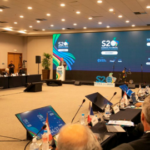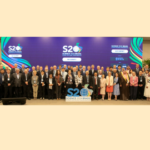Taxation of ‘Super-Rich’ Will Only Be Effective with Global Adherence, Says Ambassador Maurício Lyrio
By Victoria Netto to Valor Rio, July 1st
The taxation of large fortunes, a proposal led by Brazil in the rotating presidency of the G20 this year, depends on global adherence to be successful, according to Ambassador Maurício Lyrio, Secretary of Economic and Financial Affairs at the Ministry of Foreign Affairs and G20 Sherpa for Brazil, the personal emissary of the government leading the negotiations.

Ambassador Maurício Lyrio, G20 Sherpa for Brazil
Lyrio, who participated in the discussions of Science 20 (S20) in Rio on Monday (1), also spoke to Valor about proposals related to energy transition, climate change, debt swaps, and combating hunger — the latter being a priority theme for Brazil in the group of the world’s largest economies.
According to the ambassador, the government proposes continuing the debate initiated in 2021 when the G20, in a binding agreement with the Organisation for Economic Co-operation and Development (OECD), developed the so-called “Two-Pillar Solution,” which seeks to better direct the taxation of multinational companies in their various markets.
Pillar 1 stipulates that part of the profits of multinationals remains in the market jurisdiction where the company earns profits, while Pillar 2 establishes a 15% tax on their global operations. Now, the Brazilian government is seeking a new pillar.
The Ministry of Finance, through Minister Fernando Haddad, head of the G20 Financial Track, commissioned French economist and University of California professor Gabriel Zucman to prepare a study advancing the binding agreement already in practice and proposing a 2% tax on large fortunes.
According to the report, there are about 2,000 to 3,000 “super-rich” individuals in the world, and a global agreement among all countries would result in taxing these billionaires generating between $200 billion and $250 billion per year.
“It is an important negotiation to ensure effective international coordination because a global taxation effort is futile if not accepted by all countries. We must act collectively; this is the way to avoid tax evasion by defining headquarters,” declared Lyrio.
The ambassador further stated, “It’s not simple, but Minister Haddad has managed to bring the topic to various governments, and I would say there is already a lot of positive reaction.” Lyrio noted that there is still no consensus on how the revenue collected from the taxation would be allocated.
With contributions from French economist Esther Duflo, Nobel laureate in Economics in 2019, the creation of a climate change adaptation fund is being discussed. This fund would directly transfer resources to people in countries affected by extreme climate events.
Duflo, who was in Brazil again last week and met with Lyrio at Itamaraty, had already joined Brazilian efforts related to taxing billionaires. She was invited by Haddad in April this year to discuss her idea at a dinner with economic leaders of the group in Washington, during the spring meeting of the International Monetary Fund (IMF) and the World Bank.
‘Brazil has already made the energy transition’
The ambassador also noted that the G20 Summit will coincide with the COP29 in Baku, Azerbaijan, and that there should be cross-influence between the summits. He believes that to achieve the goals of the Paris Agreement and future agreements, multilateral negotiation is the only way. “The planet’s emissions are the mission of several countries, so there must be mutual and horizontal commitment from everyone to limit their emissions,” he observed.
The Sherpa also highlighted that the G20 is a diverse group, with countries rich in fossil fuels and others in renewable sources, such as Brazil. For him, Brazil is one of the few cases where new fronts of oil and gas exploration, such as in the Equatorial Margin, should not have much impact.
“Brazil is a very particular case; we made the energy transition before the environmental problem. About 93% of the electricity generated in Brazil is renewable, much of it hydroelectric, with a part also solar and wind,” he highlighted. “Exploring more oil does not change this matrix; our emissions [through energy] are already much lower than those of other countries.”
Global Alliance Against Hunger
As Brazil’s main initiative in the G20, the ambassador highlighted the “Global Alliance Against Hunger,” based on three pillars:
Autonomous Pillar: Countries wishing to join must choose a social program from a basket of options to implement domestically.
Financial Pillar: This will establish mechanisms for countries joining the initiative to access resources from international organizations, private donations, and other nations. Brazil advocates for debt swaps, meaning indebted countries can renegotiate with their creditor if they commit to reallocating the money into social programs.
Knowledge and Cooperation Pillar: The idea is for countries with good experiences in public policies to combat hunger to provide technical assistance to other nations.
From July 3 to 5, Lyrio will receive proposals from representatives of the 13 engagement groups that make up the social axis of the economic forum at the G20 Sherpa track meeting. For the first time, contributions will be delivered in time to be incorporated into the Declaration to be sent to the member states at the Leaders’ Summit in November in Rio. Between the two meetings, there will also be a Forum bringing together all representatives of the engagement groups.
“Since last year, the president has instructed to reinforce the dialogue between the ‘G20 government’ and ‘G20 civil society.’ It used to be an informal relationship; we have institutionalized it. It’s not a formality, not receiving on the eve when the Declaration is already negotiated; we want a real contribution,” highlighted the ambassador. “The ability of the various groups to draw attention to issues that leaders should address is something we consider very important.”




